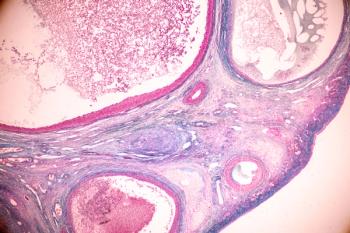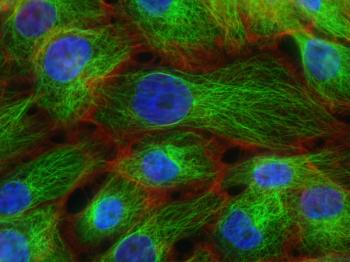
The study provides preliminary evidence of improvements in sexual function in breast cancer survivors who receive laser therapy.

The study provides preliminary evidence of improvements in sexual function in breast cancer survivors who receive laser therapy.

Genitourinary Syndrome of Menopause is often overlooked by providers.

The challenge of diagnosis occurs in distinguishing “normal” from “abnormal” in a time of rapid and dynamic change.

A prospective study from the People’s Republic of China has concluded that menopausal symptoms in women with premature ovarian insufficiency (POI) were significantly higher than in women with natural menopause.

Women with HIV are no more vulnerable to menopause-related cognitive declines compared to other women, according to a longitudinal cohort study in the journal Menopause.

A study in the journal Vascular Health and Risk Management has found significant differences in the metabolite profiling of altered amino acid and lipoprotein metabolism in participants with atherosclerosis and osteoporosis, compared with those in healthy menopausal women.

It has yet to be fully elucidated why postmenopausal women have a higher prevalence of benign paroxysmal positional vertigo (BPPV); however, the sudden decrease in estrogen during menopause can cause a rapid decrease in estrogen receptors, which may disturb otoconial metabolism and thus, increase the prevalence of BPPV.

Postmenopausal women with elevated hypertension who participated in the high-intensity team sport of floorball, a form of indoor hockey, achieved a significant decrease in their blood pressure.

The compounded bioidentical hormone industry needs major changes in oversight to keep consumers safe.

A secondary analysis of the Women’s Health Initiative (WHI)-Calcium and Vitamin D (CaD) clinical trial has concluded that vasomotor symptom severity is not linked to any clinical event.

In this video, Senior Editor Angie DeRosa interviews Nanette Santoro, MD, Chair of the 2020 Scientific Program Committee for the Virtual Annual Meeting of the North American Menopause Society (NAMS).

Poor sleep occurs frequently among midlife women, which is significantly linked to childhood and adult trauma, according to a prospective study presented at the 2020 Virtual Annual Meeting of the North American Menopause Society (NAMS).

This article is based on information presented at the 2020 Virtual Annual Meeting of the North American Menopause Society (NAMS). According to NAMS, all presentations have been pre-recorded and now are available for on-demand viewing beginning Sept. 28 through Sept. 21, 2021.

Postmenopausal women are significantly more likely to meet criteria for metabolic syndrome than are premenopausal women, according to a cross-sectional analysis of women aged 45 to 85.

Perimenopausal women with prior depression exhibit significantly more depressive symptoms, more menopausal symptoms, and more sleep disturbances than perimenopausal women without prior depression, according to a study from Switzerland.

Considerable heterogeneity exists in reported outcomes and measures used in clinical trials of treatments for genitourinary syndrome of menopause (GSM), which impacts between 40% and 60% of postmenopausal women, according to a systematic review in the journal Menopause.

A new study finds that dairy products do not prevent age-related bone loss or fractures in menopausal women.

Women who were in the top third of hot flash severity showed a 67% increase in cortisol, whereas those in the bottom third of hot flash severity showed only a 30% increase.

A prospective study of generally healthy perimenopausal women has concluded that low bone mineral density (BMD) is significantly linked with periodontal disease in women over 58 years old, and independent of tobacco consumption or oral hygiene.

A study from the Long Island Breast Cancer Study Project (LIBCSP) investigated the association between menopausal hormone therapy (MHT) and mortality outcomes among breast cancer survivors.

Postmenopausal women who breastfed for at least 6 months cumulatively have a significantly lower incidence of subclinical atherosclerosis compared to postmenopausal women who breastfeed for a shorter duration, according to a cross-sectional study in the journal Gynecological Endocrinology.

Lack of patient knowledge about the natural process of menopause and lifestyle interventions are two major challenges to symptom control.

A peak in hot fl ash reports was observed in July, while January had a trough in hot fl ash reports.

The authors noted that, although recent guidelines embrace using history of menopause before age 40 to refine atherosclerotic cardiovascular disease (ASCVD) risk assessments in middle-aged women, “robust data on cardio-vascular disease risk in this population is lacking.”

Allegations in this complex case include negligence in performing laparoscopic hysterectomy and delaying treatment of bladder injury.